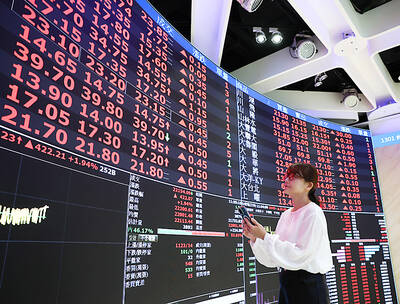The local branch of CB Richard Ellis Ltd, an international real estate agency, yesterday released its annual top 10 rankings for Taipei office buildings in terms of location, building image, management, rents and corporate tenants.
"2005 marks the year for the office-building market in Taipei to step up its internationalization," the company's managing director, Andrew Liu (
The top 10 buildings as tallied by CB Richard Ellis in order of their completion date are the Taipei 101 Tower, Uni-President International Building, Continental Engineering Corp Tun Nan Office Building, Cathay Hsinyi Trading Center, Cathay Financial Center, Shinkong Manhattan World Trade Building, CEC Hander Minsheng Building, Taipei Metro, Hung Tai Century Building and the Taipei World Trade Center Building.
Among them, Taipei Metro has the highest monthly rent, averaging NT$3,600 per ping, followed by Taipei 101's NT$3,200 and Uni-President International's and Cathay Financial's NT$3,000. Only the Hung Tai Century Building is fully occupied.
Six out of the top 10 buildings are located in the Xinyi district, which Liu concluded has become the most internationalized commercial district.
Multinationals such as Microsoft, IBM, HP and Epson plan to move into the district in the next two years, according to the agency.
Liu, in particular, acknowledged Taipei 101 tower as not only a local landmark but also an internationally-renowned skyscraper, although its office space is not yet filled.
Liu expects monthly rents of the top-tier office buildings in Taipei, which currently average at NT$2,450 per ping, to rise further in the near future.
Office buildings in the Xinyi district and Tunhwa North and South Road districts will be more likely to raise rents, given their low vacancy rates, according to Lien Sheng-wu (
The Shinkong Life Tower, Fubon Financial Center and Aurora Intelligent Building meanwhile, which were included on the list in 2003, were bumped off the list this year as top-ranked tenants have moved out.
The agency also expressed optimism on Taipei's commercial property market this year, after rents rose 5 percent last year.
"We may see rents rebound, which will help attract investors [in the leasing market]," Liu said.
Institutional and local investors may also be interested in buying commercial properties as a result of flat prices and long-term returns from rents, Liu added.
However, the agency expects most commercial property buyers to come from the local manufacturing sector, which is marked by limited budgets and places less emphasis on location. As such, demand from this sector may not push up prices.

UNCERTAINTIES: Exports surged 34.1% and private investment grew 7.03% to outpace expectations in the first half, although US tariffs could stall momentum The Chung-Hua Institution for Economic Research (CIER, 中華經濟研究院) yesterday raised its GDP growth forecast to 3.05 percent this year on a robust first-half performance, but warned that US tariff threats and external uncertainty could stall momentum in the second half of the year. “The first half proved exceptionally strong, allowing room for optimism,” CIER president Lien Hsien-ming (連賢明) said. “But the growth momentum may slow moving forward due to US tariffs.” The tariff threat poses definite downside risks, although the scale of the impact remains unclear given the unpredictability of US President Donald Trump’s policies, Lien said. Despite the headwinds, Taiwan is likely

READY TO BUY: Shortly after Nvidia announced the approval, Chinese firms scrambled to order the H20 GPUs, which the company must send to the US government for approval Nvidia Corp chief executive officer Jensen Huang (黃仁勳) late on Monday said the technology giant has won approval from US President Donald Trump’s administration to sell its advanced H20 graphics processing units (GPUs) used to develop artificial intelligence (AI) to China. The news came in a company blog post late on Monday and Huang also spoke about the coup on China’s state-run China Global Television Network in remarks shown on X. “The US government has assured Nvidia that licenses will be granted, and Nvidia hopes to start deliveries soon,” the post said. “Today, I’m announcing that the US government has approved for us

When Lika Megreladze was a child, life in her native western Georgian region of Guria revolved around tea. Her mother worked for decades as a scientist at the Soviet Union’s Institute of Tea and Subtropical Crops in the village of Anaseuli, Georgia, perfecting cultivation methods for a Georgian tea industry that supplied the bulk of the vast communist state’s brews. “When I was a child, this was only my mum’s workplace. Only later I realized that it was something big,” she said. Now, the institute lies abandoned. Yellowed papers are strewn around its decaying corridors, and a statue of Soviet founder Vladimir Lenin

The National Stabilization Fund (NSF, 國安基金) is to continue supporting local shares, as uncertainties in international politics and the economy could affect Taiwanese industries’ global deployment and corporate profits, as well as affect stock movement and investor confidence, the Ministry of Finance said in a statement yesterday. The NT$500 billion (US$17.1 billion) fund would remain active in the stock market as the US’ tariff measures have not yet been fully finalized, which would drive international capital flows and global supply chain restructuring, the ministry said after the a meeting of the fund’s steering committee. Along with ongoing geopolitical risks and an unfavorable